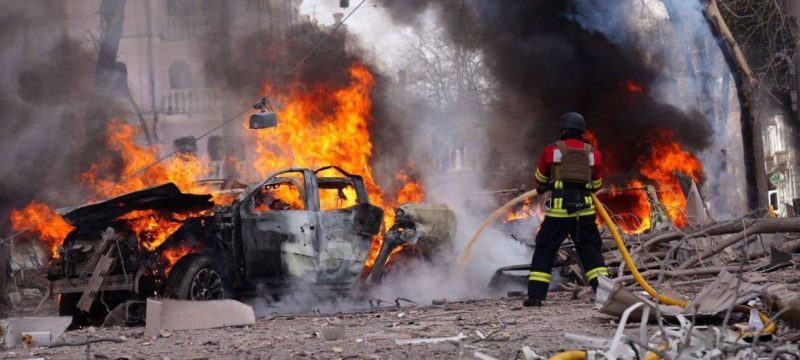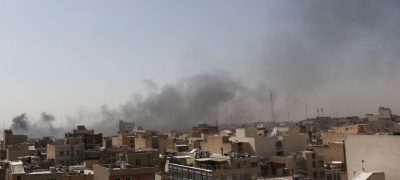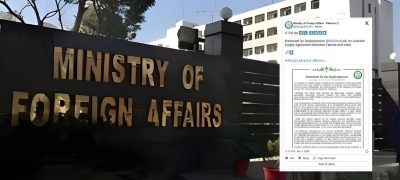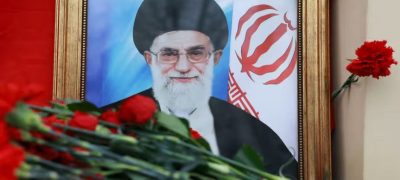At least 34 people lost their lives and 117 were wounded after two Russian ballistic missiles struck the northern Ukrainian city of Sumy on Sunday, marking what Ukrainian officials have called the most fatal attack on the country in 2025.
The missiles hit central Sumy — a city just 25 kilometers from the Russian border — causing widespread destruction. Burnt-out vehicles and rubble littered the streets following the blasts. Ukraine’s Interior Ministry reported that many of the casualties were civilians caught in cars, public transport, or nearby buildings during the strike.
Read more: Russia’s Demands Signal New Diplomatic Push Amid Ukraine War
President Volodymyr Zelenskyy strongly condemned the assault, urging the global community to take decisive action. In a video posted on social media, he stated, “Only villains can commit such acts, killing innocent people,” emphasizing that the strike occurred on Palm Sunday, suggesting Moscow intentionally targeted civilians on a sacred day.
A local resident, 27-year-old PhD student Yevhen, told Reuters: “Those fighting against us claim to follow the Orthodox faith… but what we saw today was pure terrorism. I have no words.”
Acting Mayor of Sumy, Artem Kobzar, announced a three-day mourning period starting Monday. He noted that the city, home to nearly 250,000 people, has long remained on high alert due to its closeness to Russia.
Interior Minister Ihor Klymenko accused Russia of deliberately striking civilians, calling it a calculated act of violence on an important religious holiday.
Global Outrage and Political Reactions
The attack drew widespread condemnation from international leaders. German Chancellor Olaf Scholz said the attack revealed the true nature of Russia’s peace rhetoric. Leaders from the UK and Italy also criticized the strike in strong terms.
U.S. Secretary of State Marco Rubio labeled the incident a “tragic reminder” of why the Trump administration is working to mediate an end to the war. Trump’s envoy, Howard Witkoff, reportedly met with Russian President Vladimir Putin in St. Petersburg last Friday to push for progress in peace negotiations.
In an interview with 60 Minutes, recorded prior to the Sumy attack and aired Sunday, President Zelenskyy invited former President Trump to visit Ukraine. “Come see the people, the civilians, the wounded, the destroyed homes, churches, and children,” he urged.
When asked about the U.S.’ continued support for Ukraine, Zelenskyy paused, then cautiously responded: “Even this pause shows the problem… I want to say the U.S. is our strong, strategic partner, but the pause shows doubt.” He again called for a multinational peacekeeping mission and more military aid, especially to protect Ukraine’s airspace.
Suspected Use of Cluster Munitions
Andriy Yermak, head of Ukraine’s presidential office, alleged that Russia used cluster munitions — controversial weapons banned under international law, although not by Russia — in the Sumy attack. “They’re doing everything possible to maximize civilian casualties,” he stated.
Ukrainian MP Maryana Bezuhla suggested that the strike may have been aided by leaked information regarding troop gatherings, though this claim remains unverified, and no evidence was presented. Reuters was unable to confirm the allegation.
Local residents, meanwhile, denied any military presence in the area. “This is the city center. There are no soldiers or bases here,” said Pavriz Manakhov.
Escalating Tensions and Additional Attacks
Later on Sunday, a separate Russian drone attack hit the southern port city of Odesa, injuring five people and damaging a medical facility, local authorities confirmed.
The Sumy tragedy follows a recent missile attack on Kryvyi Rih — President Zelenskyy’s hometown — earlier this month, which killed 20 people, including nine children.
Ukrainian Foreign Minister Andrii Sybiha has labeled Sunday’s attack a war crime and stated that Ukraine is sharing evidence with international allies. The International Criminal Court (ICC), which Ukraine officially joined this year, is already investigating multiple alleged war crimes committed during the ongoing conflict.
Russia’s defense ministry has not yet issued a statement. While Moscow frequently denies attacking civilian targets, independent watchdogs report that thousands of civilians have been killed since Russia’s full-scale invasion began in February 2022.
Meanwhile, Russia accused Ukraine of launching strikes on its energy infrastructure over the past 24 hours. Under a recent U.S.-brokered ceasefire agreement — which prohibits attacks on energy facilities — both sides have accused each other of breaching the deal.









